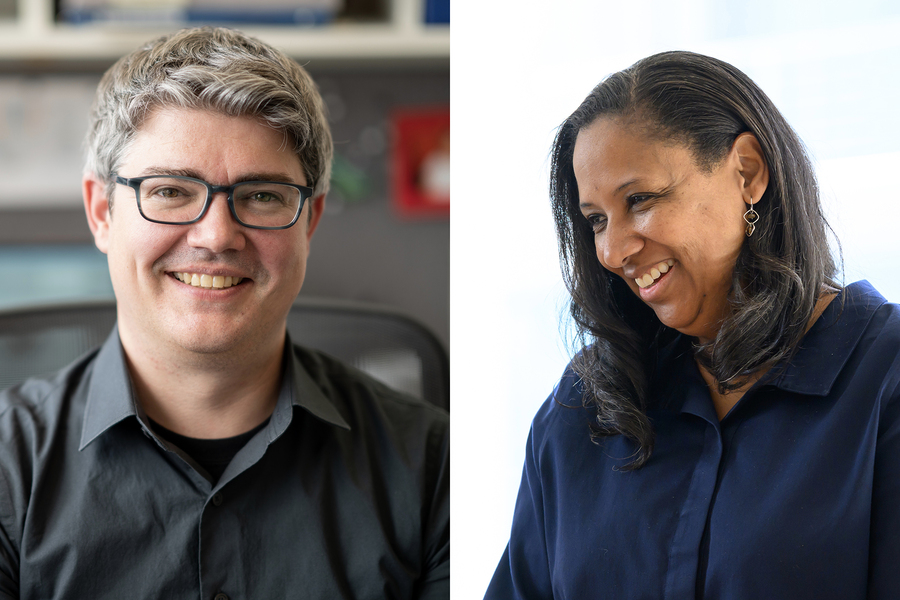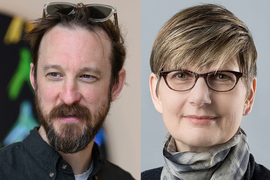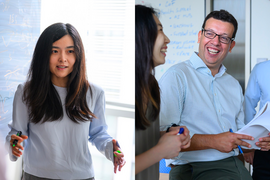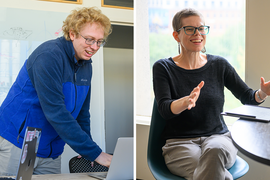Audio
MIT professors Michael McDonald and Kristala Prather embody a form of mentorship defined not only by technical expertise, but by care. They remind us that the most lasting academic guidance is not only about advancing research, but about nurturing their students along the way.
For McDonald’s students, his presence is one of deep empathy and steady support. They describe him as fully committed to their well-being and success — someone whose influence reaches beyond academics to the heart of what it means to feel valued in a community. Prather is celebrated for the way she invests in her mentees beyond formal advising, offering guidance and encouragement that helps them chart paths forward with confidence.
Together, they create spaces where students are affirmed as individuals as well as scholars.
Professors McDonald and Prather are members of the 2023–25 Committed to Caring cohort, recognized for their dedication to fostering growth, resilience, and belonging across MIT.
Michael McDonald: Empathetic, dedicated, and deeply understanding
Michael McDonald is an associate professor of physics at the MIT Kavli Institute for Astrophysics and Space Research. His research focuses on the evolution of galaxies and clusters of galaxies, and the role that environment plays in dictating this evolution.
A shining example of an empathetic and caring advisor, McDonald supports his students, fostering an environment where they can overcome challenges and grow with confidence. One of his students says that “if one of his research or class students is progressing slowly or otherwise struggling, he treats them with respect, care, and understanding, enabling them to maintain confidence and succeed.”
McDonald also goes above and beyond in offering help and guidance, never expecting thanks, praise, or commendation. A student expressed, “he does not need to be asked to advocate for students experiencing personal or academic challenges. He does not need to be asked to improve graduate student education and well-being at MIT. He does not need to be asked to care for students who may otherwise be left behind.”
When asked to describe his advising style, McDonald shared the mantra “we’re humans first, scientists second." He models his commitment to this idea, prioritizing balance for himself while also ensuring that his students feel happy and fulfilled. “If I’m not doing well, or am unhappy with my own work/life balance, then I’m not going to be a very good or understanding advisor,” McDonald says.
Students are quick to identify McDonald as a dedicated and deeply understanding teacher and mentor. “Mike was consistently engaging, humble, and kind, both bolstering our love of astrophysics and making us feel welcome and supported,” one advisee commended.
On top of weekly meetings, he conducts separate check-ins with his students on a semesterly basis to track not only their accomplishments and progress toward their personal goals, but also to evaluate his own mentoring and identify areas of improvement.
McDonald “thinks deeply and often about the long-term trajectory of his advisees, how they will fit into the modern research landscape, and helps them to develop professional and personal support networks that will help them succeed and thrive.”
McDonald feels that projects should be so much fun that they do not feel like work. To this end, he spends a lot of time developing and fleshing out a wide variety of research projects. When he takes on a new student, he presents them with five to 10 possible projects that they could lead, and works with them to find the one that is best matched to the student’s interests and abilities.
“This is a lot of work on my end — and many of these projects never see the light of day — but I think it leads to better outcomes and happier group members,” McDonald says. One of the most impactful qualities in a mentor and supervisor is how they deal with challenges and failures, both their own and those of others, which McDonald does very effectively.
One nominator sums up McDonald’s character, writing that “Michael McDonald fully embodies the spirit of Committed to Caring as a teacher, advisor, counselor, and role model for the MIT community. He consistently impacts the lives of his students, mentees, and the physics community as a whole, encouraging us to be the best versions of ourselves while striving to be a better mentor, father, and friend.”
Kristala Prather: Meaningful support and departmental impact
Kristala Prather is the Arthur Dehon Little Professor of Chemical Engineering and is the head of the Department of Chemical Engineering. Her research involves the design and assembly of novel pathways for biological synthesis, enhancement of enzyme activity and control of metabolic flux, and bioprocess engineering and design.
Prather has proven to be a dedicated mentor and role model for her students, particularly those from underrepresented backgrounds. One nominator mentions that as an immigrant woman of color with no prior exposure to academia before coming to MIT, Prather’s guidance has been extremely important for her. Prather has pointed the nominator to resources that she didn't know existed, and helped her navigate U.S. and academic norms that she was not well-versed in.
“As an international student navigating two new cultures (that of the U.S. as well as that of academia), it is easy to feel inadequate, confused, frustrated, or undeserving,” the student stated. Prather’s level of mentorship may not be easy to find, and it is extremely important to the success of all students, especially to marginalized students.
Prather actively listens to her students’ concerns and helps them to identify their areas of academic improvement with regard to their desired career path. She consistently creates a comfortable space for authentic conversations where mentees feel supported both professionally and personally. Through her deep caring, advisees feel a sense of belonging and worthiness in academia.
“I treat everyone fairly, which is not the same as treating everyone the same,” Prather says. This is Prather’s way of acknowledging the reality that each individual comes as a unique person; different people need different advising approaches. The goal is to get everyone to the same endpoint, irrespective of where they start.
In addition to the meaningful support which Prather provides her students, she has also dedicated extra time to mentoring. One nominator explained that Prather has been known to meet with individual students in the department to check in on their progress and help them navigate academia. She also works closely with the Office of Graduate Education to connect students from disadvantaged backgrounds to resources that will help them succeed. In the department, she is known to be a trustworthy and caring mentor.
Since much of Prather’s mentoring goes beyond her official duties, this work can easily be overlooked. It is clear that she has deliberately dedicated extra time to help students, adding to her numerous commitments and official positions both inside and outside of the department. Through their nominations, students called for the recognition of Prather’s mentorship, stating that it “has meaningfully impacted so many in the department.”









